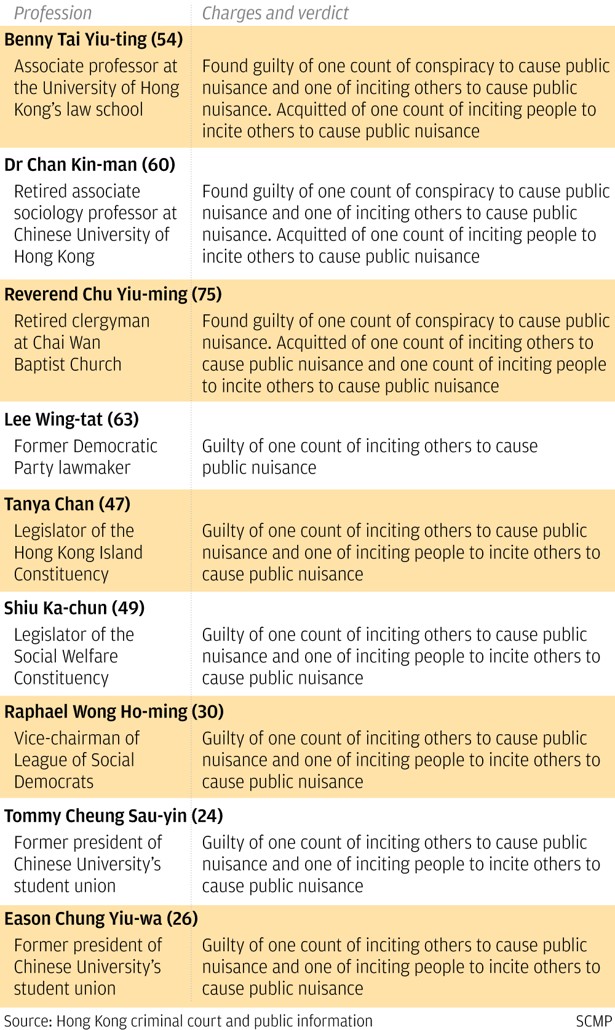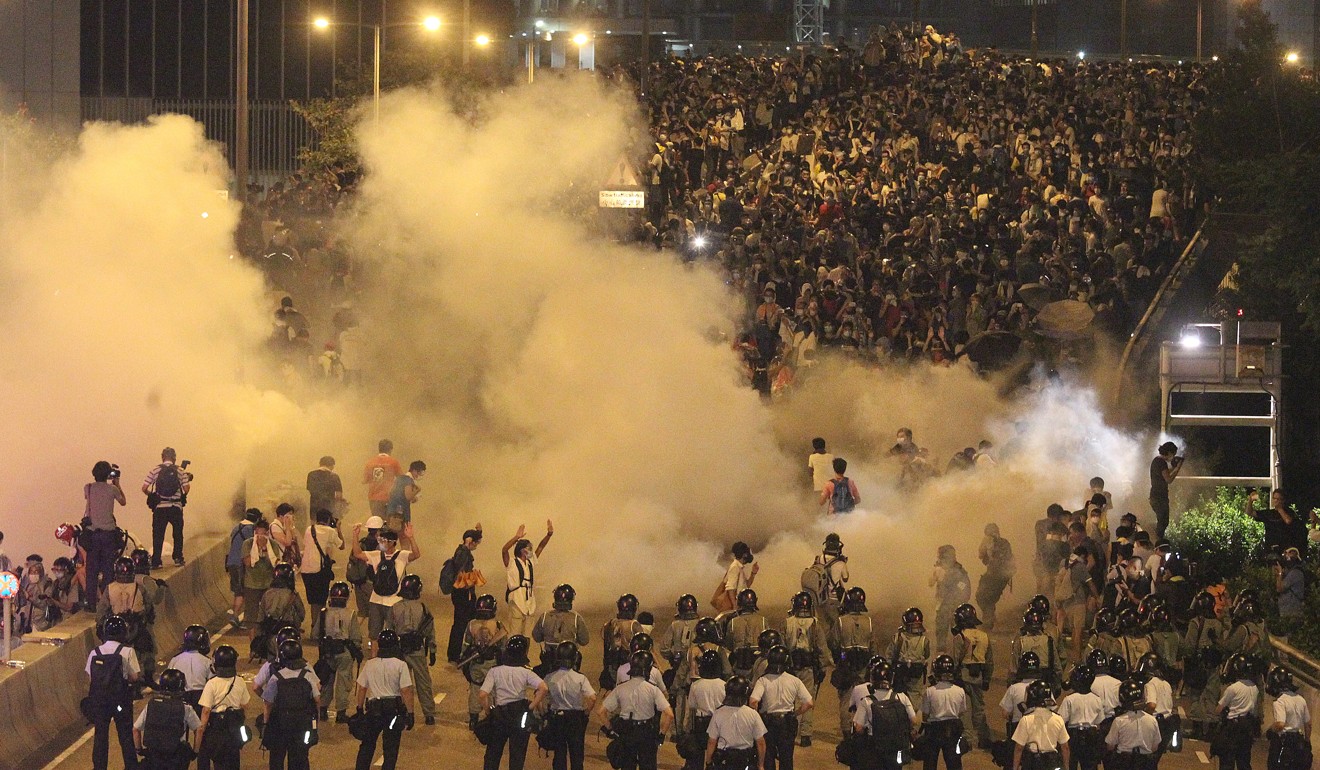
Occupy leaders found guilty over role in Hong Kong’s 2014 umbrella movement
- They made up the last group to be tried over 79-day protests for greater democracy in the city
- Judge rules that, while Hong Kong courts recognise the notion of civil disobedience, it ‘is not a defence to a criminal charge’
Nine democracy leaders responsible for the largest civil disobedience movement in Hong Kong’s history were on Tuesday found guilty over their roles in the 2014 protests.
Judge Johnny Chan Jong-herng called the three founders of the city’s Occupy movement – academics Benny Tai Yiu-ting, 54, and Dr Chan Kin-man, 60, and Reverend Chu Yiu-ming, 75 – “naive” to suggest that by encouraging people to block roads they could force the government to bow to their political demands.
And while Hong Kong courts recognised the notion of civil disobedience, it “is not a defence to a criminal charge”, he wrote in a 268-page judgment.
Prosecutors had said the nine caused obstructions by mobilising protesters to block major thoroughfares in the heart of the city almost five years ago.
No matter what happens, I am confident that many of us will continue to strive for democracy. We will persist and will not give up
Tai, Chan and Chu were all found guilty of one count of conspiracy to cause public nuisance. Tai and Chan were also convicted of one count of inciting others to commit public nuisance.
The three were acquitted of one count of inciting others to incite, and Chu was also cleared of one count of incitement.
Legislators Tanya Chan, 47, and Shiu Ka-chun, 49, former student leaders Tommy Cheung Sau-yin, 24, and Eason Chung Yiu-wa, 26, and League of Social Democrats vice-chairman Raphael Wong Ho-ming, 30, were found guilty of one count each of inciting others to incite and one count each of inciting.
Former Democratic Party lawmaker Lee Wing-tat, 63, was found guilty of one incitement charge.
Who are nine key Occupy leaders and what have they been convicted of?
They face jail sentences of up to seven years for each charge. A jail term of more than three months could also cost Tanya Chan and Shiu their Legislative Council seats.
After the verdicts were delivered, Gerard McCoy, barrister for the founding trio, asked that the court be adjourned until the afternoon, to give the lawyers time to digest the ruling.

McCoy began his mitigation after the court reconvened and called the defendants’ acts “altruistic and selfless”, and said they were willing to serve a community service order if the court found it fit.
The court was adjourned to Wednesday to hear mitigation from the other defendants.
The nine were the final group to be tried by a court over the 79-day protests, also known as the “umbrella movement”, which they thought could drive political change in Hong Kong.
The 18-day trial at West Kowloon Court, which began last November, featured hours of protest footage and days of police testimony.

The protests were sparked by frustration with a restrictive proposal Beijing issued for the election of Hong Kong’s leader. Pro-democracy protesters were upset because the proposal lacked an option that would allow them to nominate candidates.
The occupation kicked off in earnest after Tai announced the start of the movement on September 28, 2014. Later that day, police tear-gassed the crowd, but failed to disperse them.
The unprecedented civil disobedience exercise turned into an occupation that spread from Admiralty to Wan Chai and Central, the city’s prime commercial districts.
Protestants and Catholics join forces in show of support for Occupy activists
The founding trio’s plan was that when protesters swamped the roads, the government’s primary concern would be to introduce the type of universal suffrage they advocated, rather than removing protesters.
But, in his judgment, the judge called that “unrealistic”.
“It is naive to suggest that a concession to introduce the form of universal suffrage advocated by the trio could be made by the government overnight with a click of fingers,” he wrote.
He also said that, while the trio had tried to keep their efforts proportionate, they found the impact on the area was acceptable as long as they did not completely paralyse the designated district. “The yardstick they used was totally wrong,” Judge Chan wrote, saying they exceeded what the law would tolerate.

He also rejected the defence’s argument that the crowd was attracted by the firing of the tear gas. He ruled that the organisers intended all along that a large crowd would turn out, and they were only “riding with the tide”.
During the trial, defence lawyers also argued that their clients were prosecuted with vague charges that carry harsher punishments than merely taking part in an unlawful assembly, the charge protesters normally face.
But Chan rejected that the charge would have a “chilling effect” on freedom of expression, as they suggested.
Hong Kong’s last colonial governor, Chris Patten, condemned the verdict, calling the prosecution “vengeful”.
“At a time when most people would have thought the aim of the Hong Kong government should be to bring the whole community together, it seems appallingly divisive to use anachronistic common-law charges in a vengeful pursuit of political events which took place in 2014,” he said.
James P. McGovern, chairman of the Congressional-Executive Commission on China in the United States, and senator Marco Rubio said the prosecution punished peaceful political dissent and narrowed the space for free expression and peaceful assembly.
Speaking before he entered court, Occupy co-founder Tai said: “No matter what happens, I am confident that many of us will continue to strive for democracy. We will persist and will not give up.”
Fellow co-founder Chan said that, while the trial would affect the nine of them profoundly, he was more concerned about how Hongkongers would perceive the civil disobedience movement.
“I still believe in the power of love and peace,” he said, and called on Hongkongers not to give in.
In Beijing, foreign ministry spokesman Lu Kang said the central government firmly supported the Hong Kong government “in punishing the main perpetrators and organisers of the illegal Occupy Central in accordance with the law”, adding that the protest had challenged the city’s law, prosperity and stability.
Lu said it was “biased or groundless” for any foreign politician to suggest the ruling had undermined Hong Kong’s freedoms.
But a group of pan-democratic lawmakers issued a statement accusing the government of censoring opposition through the judiciary.
Pro-democracy group Demosisto, co-founded by one of the faces of the movement, Joshua Wong Chi-fung, said it was appalled by the verdict.
Additional reporting by Tony Cheung


